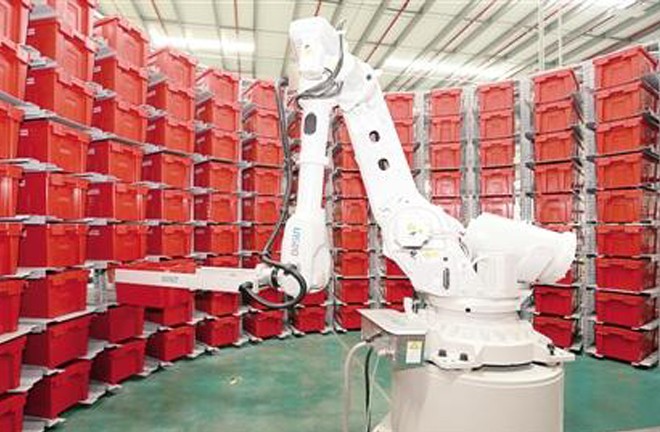Digital technologies to drive economic transformation and upgrading

A big robotic arm picks cargo, encircled by red containers at an intelligent warehouse in Haining, Zhejiang Province. (XINHUA)
Since the 18th CPC National Congress, China has emphasized the development of its digital economy, unveiling a series of major strategies and policy measures like the “Made in China 2025” plan, the “Internet Plus” strategy, the Action Outline for Promoting Big Data Development, and the Development Planning for a New Generation of Artificial Intelligence. In this context, scholars concurred that digital economy is not only a new engine of growth, but also a vital force driving economic transformation and upgrading.
“As an emerging economic form, digital economy is the inevitable result of industrial innovation against the backdrop of a digital technology revolution featuring the internet, big data, cloud computing and artificial intelligence,” said Luo Pinliang, a professor from the School of Management at Fudan University, adding that it reflects features of innovation-driven high-quality development.
The report to the 19th Party congress stressed the further integration of the internet, big data and artificial intelligence with the real economy, fostering new areas and drivers of growth in mid-range to high-end consumption, innovation-driven development, and support for upgrading traditional industries. Li Yongjian, head of the Department of Internet Economy at the National Academy of Economic Strategy under the Chinese Academy of Social Sciences, said digital economy will further penetrate each and every aspect of social and economic life, so maximizing its potential in the process will be a priority in the future strategic development of the digital economy, Li said.
Regarding development trends, the future digital economy will be committed to constructing the next generation of digitalized infrastructure and cultivating active entities represented by internet companies in the narrow sense, while facilitating the transformation and upgrading of the real economy, applying extensively to benefit the people and society, and accelerating the modernization of economic and social governance, said Bai Xuejie, deputy dean of the College of Economic and Social Development at Nankai University.
The government work report of 2018 also mentioned big data and artificial intelligence, “We will implement the big data development action plan, step up next-generation artificial intelligence R&D and application, and do more to promote the Internet Plus model in many fields like medical care, eldercare, education, culture and sports.” As key technologies of the new round of information technology revolution, the internet, big data and artificial intelligence shoulder the mission of advancing the transformation and upgrading of traditional industries.
Bai identified information flow as a core element of digital economy that can empower technology, capital, talent and material flows to break down supply and demand barriers while optimizing the allocation of resource factors, thereby enhancing the full factor productivity and accelerating upgrades to traditional industries.
Digital technologies like the internet, big data and artificial intelligence are highly permeable, sharing and contagious, which poses challenges to enterprises in terms of reforming modes of production and organization, competition and cooperation, and interaction with consumers, Bai said.
“The internet, big data and application will significantly lower the operational cost of the real economy, while improving the labor productivity of the real economy,” said Wang Jinzhao, a professor from the Economics and Management School at Wuhan University. Boosting the deep integration of the digital and real economy is a task of not only supply-side structural reform, but also the reshaping of China’s growth model, Wang said.
(edited by CHEN MIRONG)
